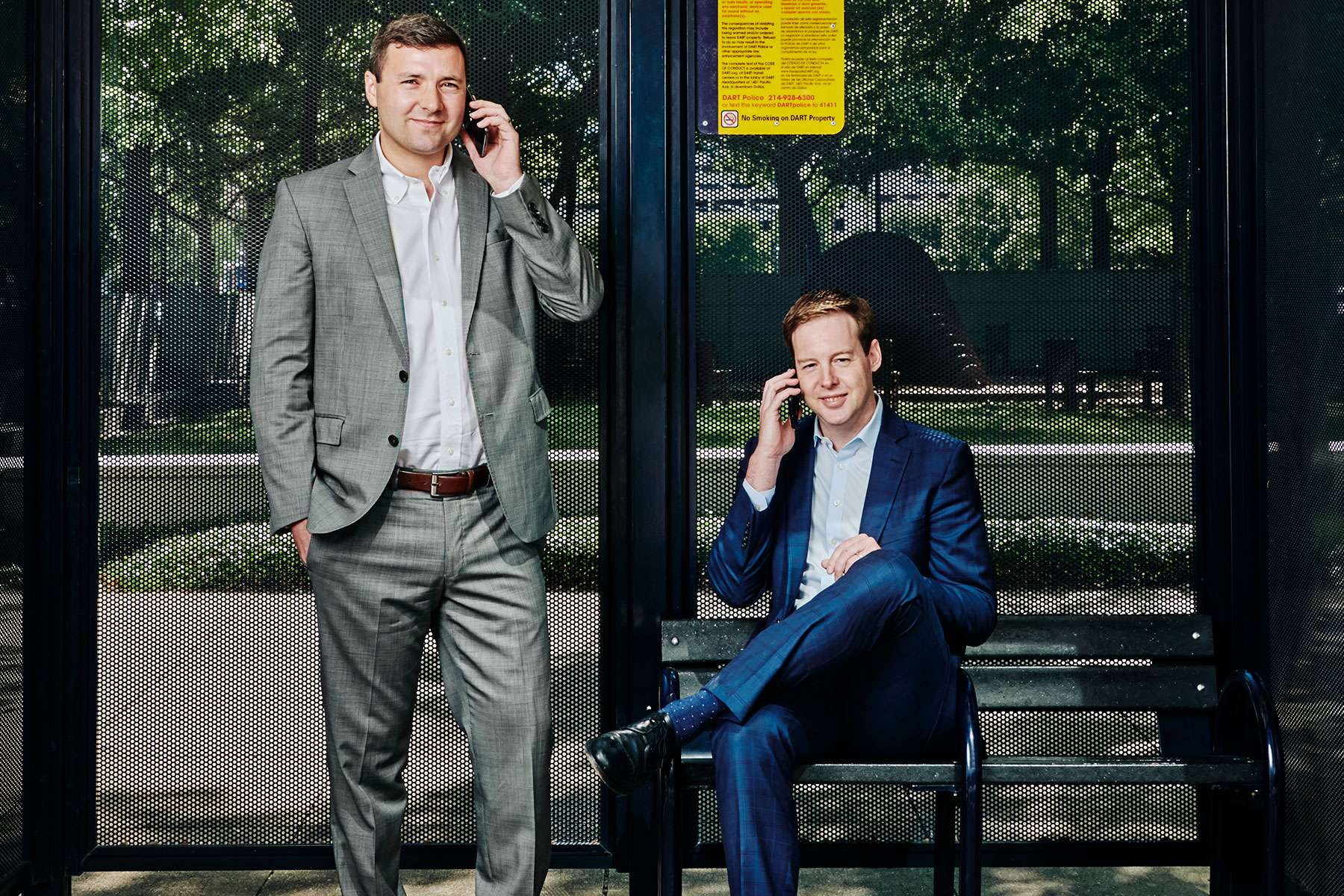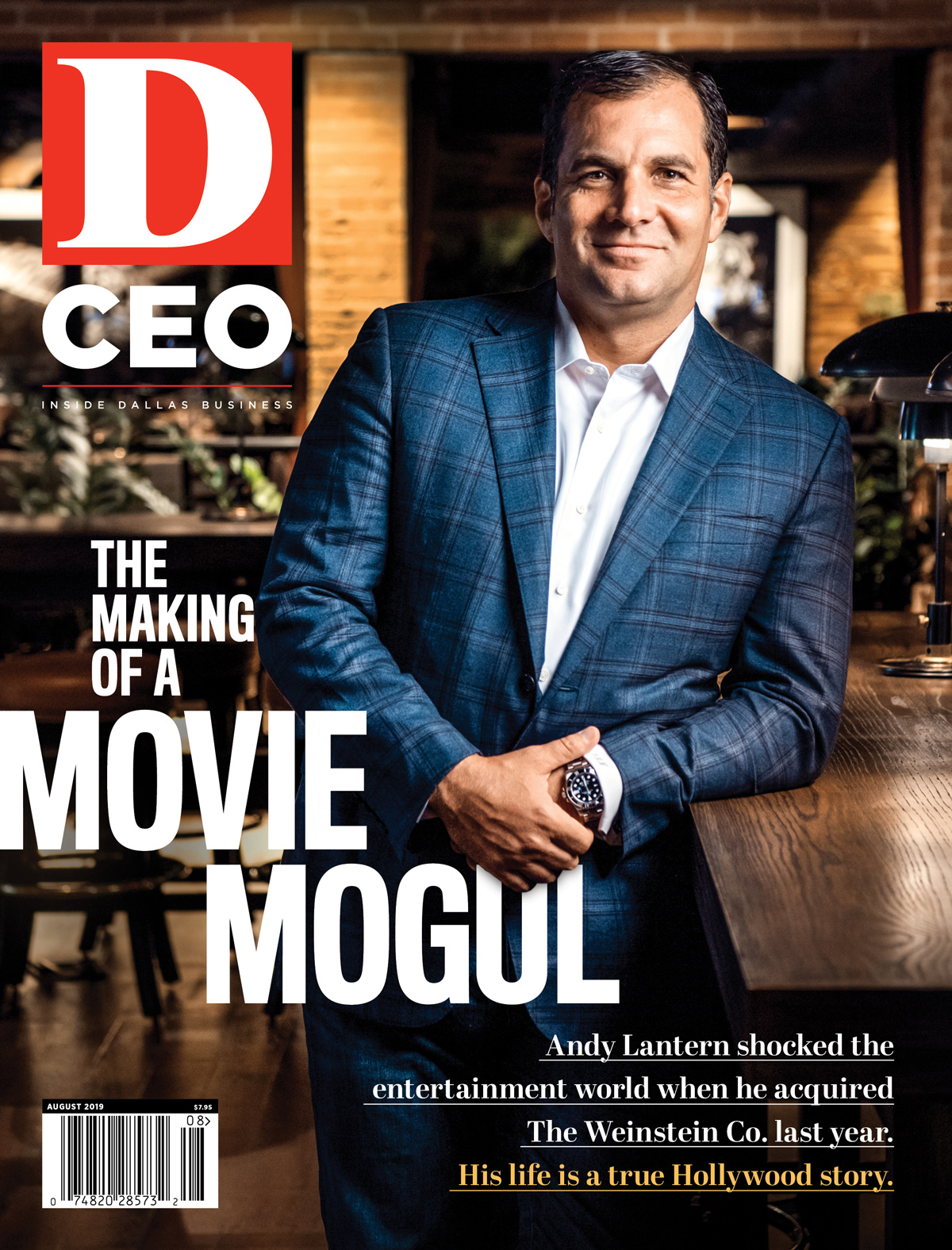Throughout its nearly 50-year history, Republic Property Group has built a reputation for developing single-family communities in outer suburbs, like Stonebridge Ranch in McKinney and Lantana north of Flower Mound. It’s continuing to do that work and has several massive projects underway. But Jake Wagner and Tony Ruggeri, the 30-something co-CEOs who took over in 2014, also want to tap into the demand for urban, walkable space. And they’re moving their corporate headquarters to the core of downtown to support that goal.
“It’s time for a change,” Wagner says. “We continue to hear about things going on downtown, and it’s starting to feel like it’s really happening with the residential there.”
For nearly 20 years, Republic Property Group has been based in a traditional office building across from NorthPark Center. Now, it has leased a full 12,500-square-foot floor at 400 S. Record St. in the West End. Built in 1985 and once known as the Belo Building, the 17-story tower is also home to City Electric Supply (led by Thomas Hartland-Mackie, who owns the building) and the French restaurant Bullion.
Ruggeri says the move will give him and Wagner the chance to contribute to the resurgence of a city they’ve always called home. “We want to learn more about Dallas and hopefully find opportunities to work in Dallas,” he says. “We thought moving downtown would be a good way to plant a flag and meet people and better understand the market.”
The co-CEOs are known as innovators in their industry. They don’t take on a lot of projects so they can stay hands-on, even when it comes to the finer details. Like other leaders their age, Ruggeri and Wagner are determined to have impact. And they take seriously their role in shaping an environment where people will spend a good chunk of their lives.
To ensure residents had super-fast WiFi at Walsh, their 7,200-acre development in West Fort Worth, they launched their own telecom company. They also formed their own management company, not only to make sure their properties were properly maintained and looked pristine, but also to ensure quality on the lifestyle side, through various community-building activities. “It’s really the whole environment, whether it’s physical amenities or making sure the trails lead someplace that is walkable, but also some of the soft programming and events—whatever will help create a better place,” Ruggeri says.
He and Wagner have an advantage, they say, because they exactly represent one of their targeted demographics—parents with young children. The key is focusing on the small things, not just the big things.
“We can have an event and check a box, or we can have an event that is meaningful and impactful and people walk away with new friendships and experiences, interests, or hobbies—and that’s what we try to do,” Ruggeri says. “We had a ‘maker fair’ this weekend at Walsh, and 200 people were there. We were teaching kids how to build rockets and about robots. I get excited thinking about the possibility of some 8-year-old girl walking away thinking, ‘I love robotics. I want to get into this.’”
One of the parks in Walsh is a musical playground, where, if children know the secret spot to hit on the jungle gym, it turns into a drum set and the slide becomes a piano. “It’s wearing our ‘dad’ hat at the same time as wearing our ‘developer’ hat,” Wagner says. “It’s not thinking of it as a real estate project, but having the responsibility that developers should have of making a permanent impact—not only on the physical landscape, but on the tens of thousands of people who live there.”
Control over the environment is easier when you’re building a master-planned community from scratch. Urban markets like downtown Dallas, which has an ingrained culture that has evolved over decades, offer more of a challenge, Wagner says. But he and Ruggeri are jazzed about the opportunity. And they’re determined that their new headquarters reflects their new mission.
The interiors were designed by Austin architect Michael Hsu, whose past work includes Shake Shack’s corporate headquarters and Japanese restaurant Uchi. “We’ve been at our current office for so long, and it’s not consistent with our brand and the projects we create,” Wagner says. “This is a chance to bring inside the look and feel of the outside, while still paying homage to the 50-year history of the company. It’s an interesting dynamic of the old and the new.”
“It’s time for a change,” Wagner says. “We continue to hear about things going on downtown, and it’s starting to feel like it’s really happening with the residential there.”
For nearly 20 years, Republic Property Group has been based in a traditional office building across from NorthPark Center. Now, it has leased a full 12,500-square-foot floor at 400 S. Record St. in the West End. Built in 1985 and once known as the Belo Building, the 17-story tower is also home to City Electric Supply (led by Thomas Hartland-Mackie, who owns the building) and the French restaurant Bullion.
“It’s wearing our ‘dad’ hat at the same time as wearing our ‘developer’ hat,” Wagner says.
Ruggeri says the move will give him and Wagner the chance to contribute to the resurgence of a city they’ve always called home. “We want to learn more about Dallas and hopefully find opportunities to work in Dallas,” he says. “We thought moving downtown would be a good way to plant a flag and meet people and better understand the market.”
The co-CEOs are known as innovators in their industry. They don’t take on a lot of projects so they can stay hands-on, even when it comes to the finer details. Like other leaders their age, Ruggeri and Wagner are determined to have impact. And they take seriously their role in shaping an environment where people will spend a good chunk of their lives.
To ensure residents had super-fast WiFi at Walsh, their 7,200-acre development in West Fort Worth, they launched their own telecom company. They also formed their own management company, not only to make sure their properties were properly maintained and looked pristine, but also to ensure quality on the lifestyle side, through various community-building activities. “It’s really the whole environment, whether it’s physical amenities or making sure the trails lead someplace that is walkable, but also some of the soft programming and events—whatever will help create a better place,” Ruggeri says.
He and Wagner have an advantage, they say, because they exactly represent one of their targeted demographics—parents with young children. The key is focusing on the small things, not just the big things.
“We can have an event and check a box, or we can have an event that is meaningful and impactful and people walk away with new friendships and experiences, interests, or hobbies—and that’s what we try to do,” Ruggeri says. “We had a ‘maker fair’ this weekend at Walsh, and 200 people were there. We were teaching kids how to build rockets and about robots. I get excited thinking about the possibility of some 8-year-old girl walking away thinking, ‘I love robotics. I want to get into this.’”
One of the parks in Walsh is a musical playground, where, if children know the secret spot to hit on the jungle gym, it turns into a drum set and the slide becomes a piano. “It’s wearing our ‘dad’ hat at the same time as wearing our ‘developer’ hat,” Wagner says. “It’s not thinking of it as a real estate project, but having the responsibility that developers should have of making a permanent impact—not only on the physical landscape, but on the tens of thousands of people who live there.”
Control over the environment is easier when you’re building a master-planned community from scratch. Urban markets like downtown Dallas, which has an ingrained culture that has evolved over decades, offer more of a challenge, Wagner says. But he and Ruggeri are jazzed about the opportunity. And they’re determined that their new headquarters reflects their new mission.
The interiors were designed by Austin architect Michael Hsu, whose past work includes Shake Shack’s corporate headquarters and Japanese restaurant Uchi. “We’ve been at our current office for so long, and it’s not consistent with our brand and the projects we create,” Wagner says. “This is a chance to bring inside the look and feel of the outside, while still paying homage to the 50-year history of the company. It’s an interesting dynamic of the old and the new.”
Get the D CEO Newsletter
Stay up to speed on DFW’s fast-moving business community with weekly news reports, interviews, and insights.







